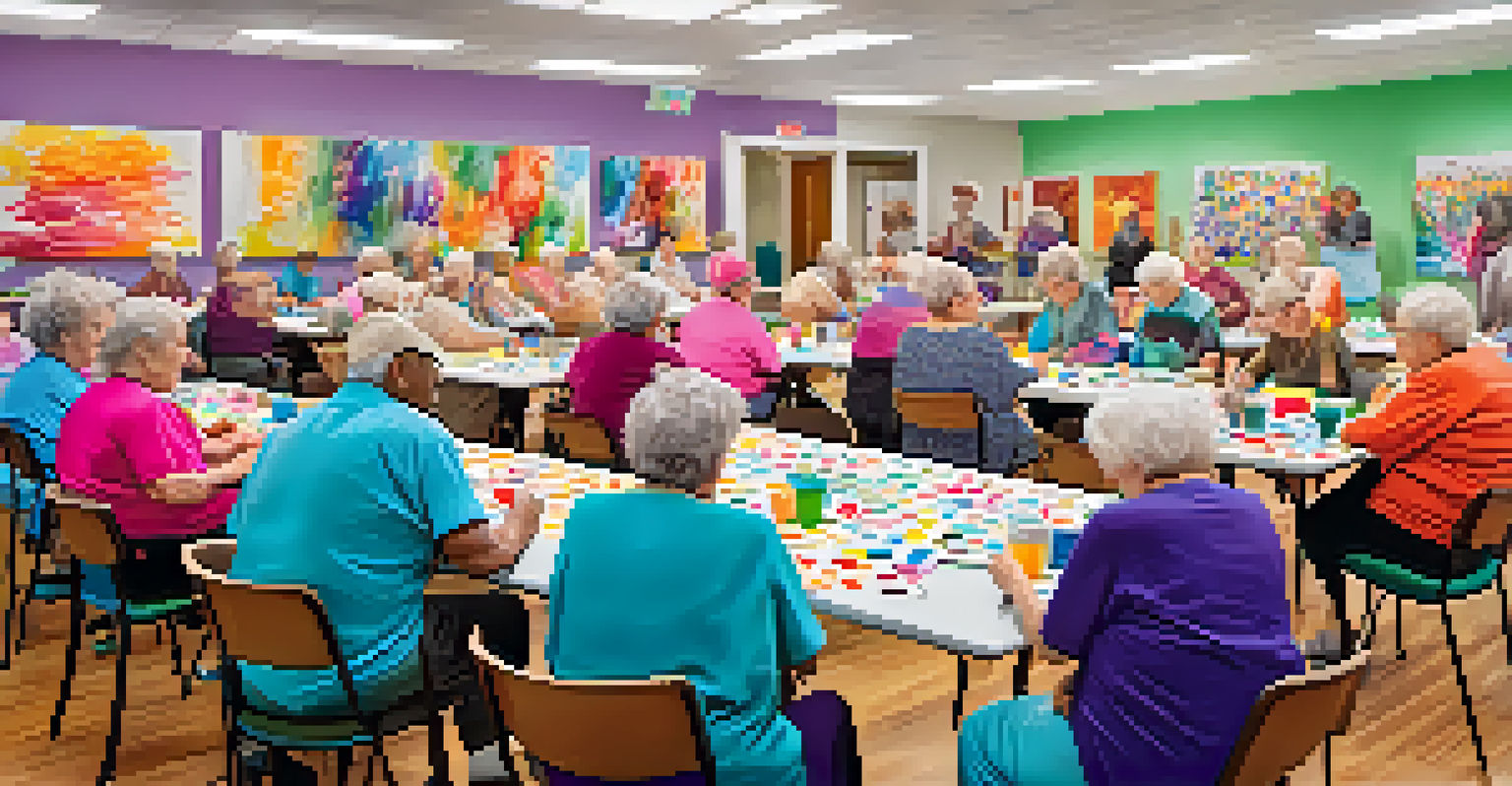Social Isolation: A Risk Factor for Addiction in Seniors

The Growing Concern of Social Isolation in Seniors
Social isolation among seniors is becoming an increasingly pressing issue, especially as the population ages. Many older adults find themselves living alone, facing physical limitations, or losing loved ones, which can lead to feelings of loneliness. This disconnect from social networks can significantly impact their mental health, making it crucial to understand its implications.
Loneliness is the first thing which God's eye named, not good.
The effects of social isolation are not just emotional; they can manifest physically as well. Seniors who are isolated may neglect their health, skip medical appointments, or avoid engaging in beneficial activities. This lack of engagement can create a downward spiral, where isolation leads to deteriorating health, further exacerbating the feeling of being alone.
Recognizing social isolation is the first step in addressing it. Communities and families must work together to identify isolated seniors and provide support systems, whether through social programs or even simple check-ins. Without these measures, the risks of addiction can increase significantly.
Understanding Addiction in the Senior Population
Addiction can take many forms, from substance abuse to behavioral addictions, and seniors are not immune to these challenges. As life changes occur, such as retirement or the loss of a partner, some seniors may turn to substances like alcohol or prescription medications as a coping mechanism. This can be particularly dangerous as their bodies may be more sensitive to these substances.

The stigma surrounding addiction often prevents seniors from seeking help, leaving them trapped in a cycle of dependency. They may feel ashamed or believe that they should be able to manage their challenges without assistance. This internal struggle is compounded by social isolation, which can lead to increased substance use as a means of escape.
Social Isolation Affects Seniors' Health
Social isolation can lead to significant mental and physical health challenges for seniors, emphasizing the need for supportive networks.
Understanding addiction in seniors requires empathy and support. Communities can play a pivotal role by providing resources, education, and access to counseling services, creating an environment where seniors feel safe to discuss their issues. Breaking down the stigma is essential for helping them reclaim their lives.
The Vulnerability of Seniors to Substance Abuse
Seniors are particularly vulnerable to substance abuse due to a combination of factors, including physical health issues and emotional changes. Many seniors are prescribed medications that can be addictive, such as opioids, which can lead to misuse. Additionally, the physical effects of aging can make it harder for them to cope without turning to substances.
The greatest disease in the west today is not TB or leprosy; it is being unwanted, unloved, and uncared for. We can cure physical diseases with medicine, but the only cure for loneliness, despair, and hopelessness is love. There are many in the world who are dying for a piece of bread, but there are many more dying for a little love.
Moreover, loneliness and boredom can drive seniors to seek out substances as a way to fill the void in their lives. This is often compounded by a lack of alternative activities or social engagements that could provide fulfillment and joy. When social connections diminish, the likelihood of substance abuse increases.
It's essential to create supportive environments that encourage healthy coping mechanisms. Engaging seniors in activities that stimulate their minds and bodies can help reduce the risk of substance abuse, providing them with a sense of purpose and community. Programs that promote social interaction are vital in combating this issue.
The Connection Between Isolation and Mental Health
Isolation can have profound effects on mental health, leading to conditions such as depression and anxiety. For seniors, these mental health challenges can create a vicious cycle, where feelings of sadness lead to further withdrawal from social activities. This isolation may push them toward substances as a way to self-medicate and escape their feelings.
Studies have shown that socially engaged seniors tend to have better mental health outcomes than their isolated counterparts. This highlights the importance of fostering social connections and providing support networks. When seniors feel supported and engaged, they are less likely to turn to addictive behaviors.
Addiction Risks Linked to Loneliness
Seniors facing social isolation are more vulnerable to addiction, often turning to substances as a coping mechanism for their loneliness.
Creating awareness around the mental health impacts of isolation is crucial. Families and caregivers should prioritize regular social interactions, whether through visits, phone calls, or community events. By promoting mental well-being, we can help reduce the risks of addiction.
Recognizing Signs of Addiction in Seniors
Recognizing the signs of addiction in seniors can be challenging, especially as some symptoms may be mistaken for normal aging. Changes in behavior, increased secrecy, or neglecting personal hygiene can be indicators that something is amiss. Family members and friends should remain vigilant and compassionate when observing these changes.
Physical symptoms such as weight loss, frequent accidents, or unusual smells can also signal substance abuse. It’s important to approach these situations with care and understanding, as accusations can lead to defensiveness and further isolation. Open communication can foster an environment where seniors feel safe to share their struggles.
Educating family members about the signs of addiction can empower them to intervene early. By creating a supportive dialogue about addiction, we can help seniors seek the assistance they need, potentially preventing a more serious dependency from developing.
Support Systems for Isolated Seniors
Establishing support systems is critical in addressing both social isolation and addiction risks among seniors. Community organizations, local initiatives, and even online resources can create networks that encourage social interaction and provide assistance. Simple programs like buddy systems, where volunteers check in on seniors, can make a significant difference.
Additionally, family involvement plays a vital role in these support systems. Regular visits, phone calls, or shared activities can help bridge the gap of isolation. Understanding the importance of social connections can encourage families to prioritize quality time with their elderly loved ones.
Community Support is Essential
Establishing community and family support systems is crucial in combating both social isolation and addiction risks among seniors.
Creating a multifaceted support approach can help mitigate the risks of addiction. By combining community resources with family engagement, we can create a safety net that promotes healthier lifestyles and emotional well-being for seniors.
Moving Forward: Strategies to Combat Social Isolation
Addressing social isolation requires proactive strategies that involve both individuals and communities. Developing programs that encourage social engagement, such as group classes or recreational activities, can help seniors build relationships and reduce feelings of loneliness. These interactions can foster a sense of belonging and community.
Technology can also play a role in combating isolation. Teaching seniors how to use video calls, social media, or online groups can help them stay connected with family and friends, even from a distance. Digital literacy programs can empower them to reach out and engage with their loved ones.

Finally, advocating for policy changes that support senior programs and resources can create lasting change. By raising awareness and promoting community involvement, we can make strides in reducing social isolation and its associated risks, including addiction. Together, we can create healthier, happier environments for our seniors.